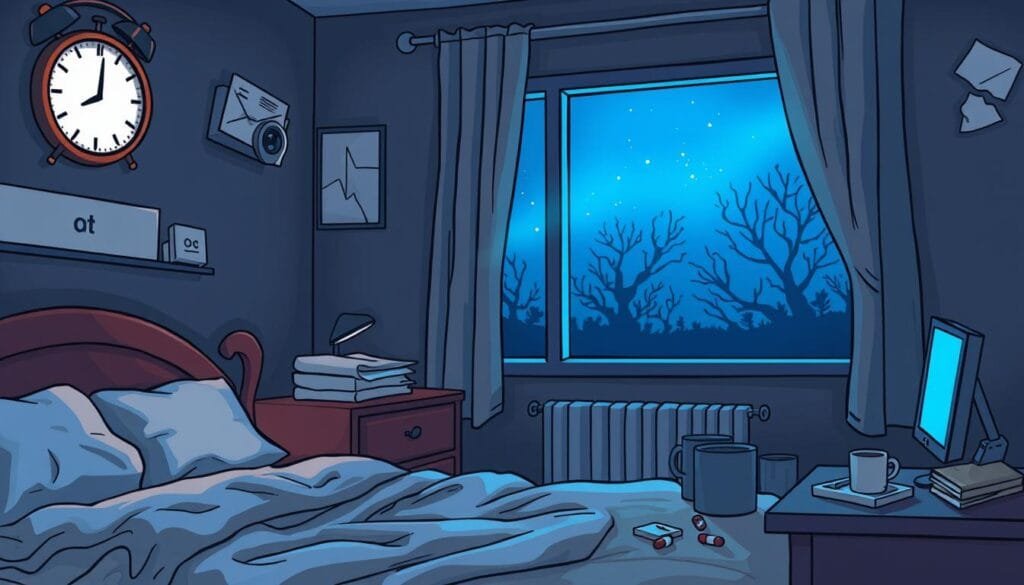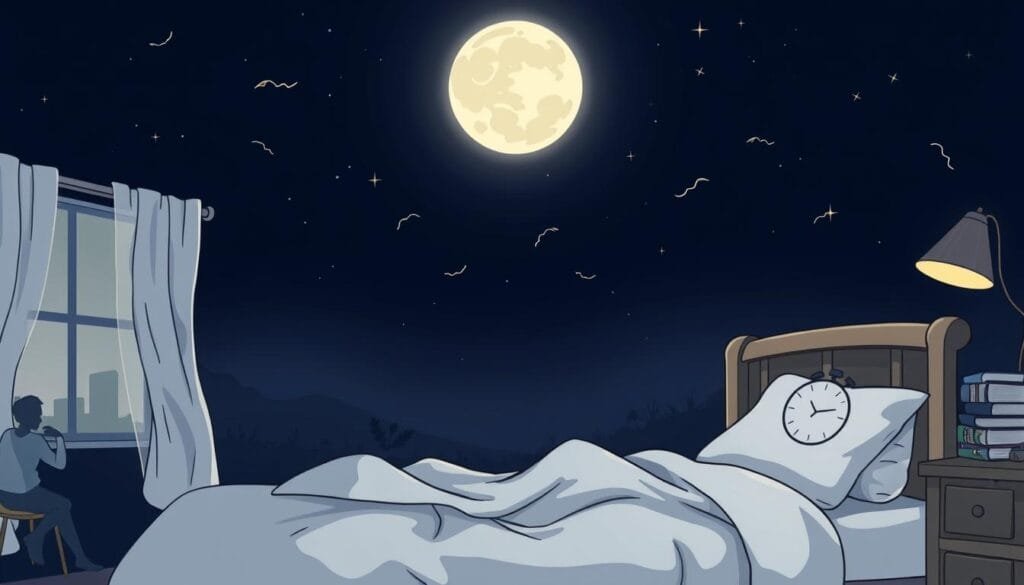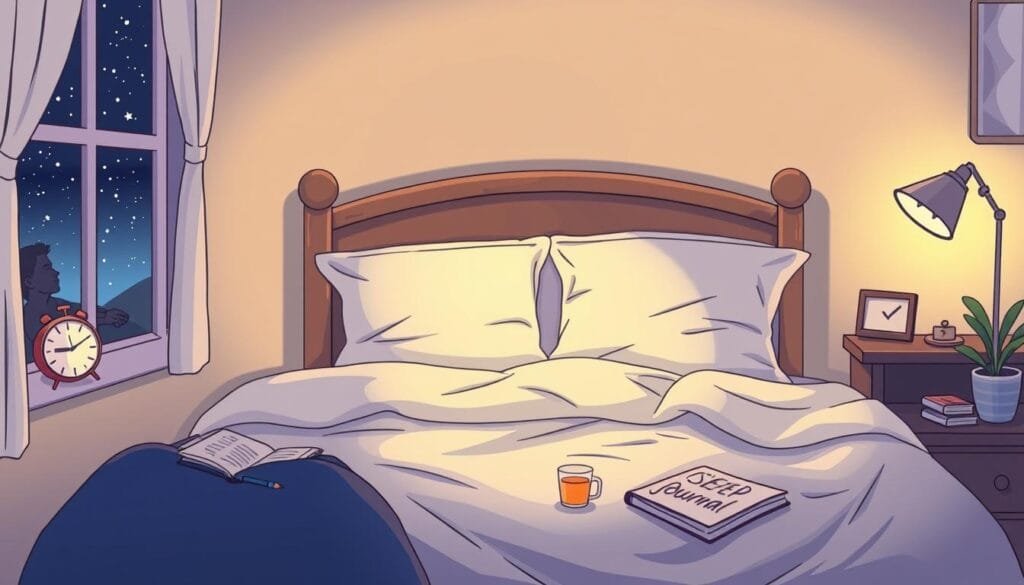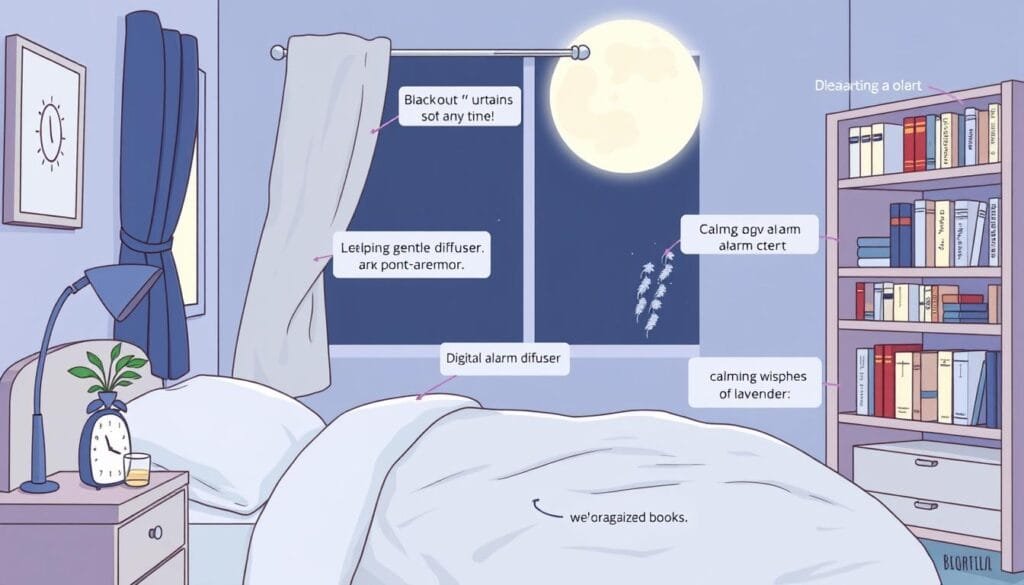Many people struggle with insomnia, waking up tired and feeling drained. I’ve been there too. It affects your health and mood. But, there’s a way to fight it, and this article will show you how.
Key Takeaways
- Insomnia is a widespread sleep disorder that can significantly impact your daily life.
- Underlying causes of insomnia include stress, environmental factors, and medical conditions.
- Cognitive behavioral therapy and lifestyle changes can be effective in treating insomnia.
- Natural remedies like herbal supplements and relaxation techniques can complement traditional treatments.
- Preventing insomnia involves establishing healthy sleep habits and addressing the root causes.
What is Insomnia?
Insomnia is a common sleep disorder. It makes it hard to fall asleep or stay asleep. This can make you feel tired and groggy during the day, even if you’ve slept enough.
Insomnia can be short-term or last a long time. Short-term insomnia lasts a few days or weeks. Long-term insomnia goes on for three months or more.
Symptoms of Insomnia
The main symptoms of insomnia include:
- Trouble falling asleep at night
- Waking up frequently during the night
- Waking up too early in the morning
- Feeling tired or sleepy during the day
- Difficulty concentrating or remembering things
Types of Insomnia
There are two main types of insomnia:
- Acute insomnia – This type lasts for a short time, usually a few days or weeks. It’s often caused by stress, big life events, or changes in sleep habits.
- Chronic insomnia – Chronic insomnia lasts for three months or more. It can be caused by health or mental issues, poor sleep habits, or other factors.
Insomnia can really affect your life. It can lower your energy, mood, and health. Knowing the symptoms and types of insomnia is the first step to dealing with it.
Causes of Insomnia
Insomnia is a complex sleep disorder with no single cause. Research shows that it often results from certain types of physiological arousal at the wrong times. This arousal can include a faster heart rate, higher body temperature, and more of certain hormones like cortisol.
Several risk factors can increase a person’s chance of getting insomnia. These include age, gender, medical conditions, sleep disorders, and mental health issues. For example, insomnia becomes more common with age as sleep patterns and health change.
- Short-term insomnia, lasting for days or weeks, often affects adults due to stress or distressing events.
- Long-term insomnia, lasting three months or more, can be caused by factors like stress, disrupted schedules, poor sleep habits, mental health issues, medications, and medical conditions.
Untreated insomnia can lead to many problems. These include lower performance, slower reaction time, mental health issues, and a higher risk of long-term diseases like high blood pressure and heart disease. It’s important to address the underlying causes of insomnia to improve sleep and overall well-being.
| Insomnia Risk Factors | Percentage of Affected Population |
|---|---|
| Being a woman | 40% |
| Being over 60 years old | 50% |
| Having mental or physical health conditions | 60% |
| Being under a lot of stress | 70% |
| Lacking a regular sleep schedule | 80% |
Sleep Disorders and Solutions
Insomnia is just one sleep disorder that can mess with your sleep. Sleep apnea and restless leg syndrome can also make it hard to fall and stay asleep. Finding solutions for these issues is key to better sleep.
Sleep apnea causes your breathing to stop and start while you sleep. It affects up to 30 million Americans, but many don’t know they have it. Restless leg syndrome (RLS) makes you want to move your legs a lot at night, making sleep hard.
There are treatments for these disorders. They include lifestyle changes, therapy, and sometimes medicine. Improving your sleep environment and routine can also help. Learning to relax can make a big difference.
| Sleep Disorder | Prevalence in the US | Symptoms | Potential Treatments |
|---|---|---|---|
| Sleep Apnea | 30 million | Breathing interruptions, snoring, daytime fatigue | CPAP therapy, oral appliances, lifestyle changes |
| Restless Leg Syndrome (RLS) | 15% of people | Uncontrollable urge to move legs, difficulty falling asleep | Medications, lifestyle changes, therapy |
| Narcolepsy | 1 in 2,000 people | Excessive daytime sleepiness, sudden muscle weakness | Medications, lifestyle changes |
| Parasomnia | 20% of children | Unusual behaviors during sleep, such as sleep walking or talking | Therapy, behavioral interventions, sometimes medication |
Knowing about different sleep disorders and their treatments helps improve your sleep. Fixing the root cause of your sleep problems leads to better solutions.
Diagnosing Insomnia
If you’re having trouble sleeping, your doctor might suggest a detailed check-up. They’ll look at your sleep habits, medical history, and any health issues that could be causing your sleep problems.
Sleep Diaries
One of the first steps is to keep a sleep diary. You’ll track when you go to bed, how long it takes to fall asleep, and how often you wake up. It also shows how rested you feel in the morning. This helps your doctor understand your sleep quality and find out what might be disrupting it.
Sleep Studies
Your doctor might suggest a sleep study, or polysomnogram. You’ll spend a night in a sleep lab where sensors watch your brain waves, breathing, and heart rate. This test can rule out other sleep disorders and give a detailed look at your sleep patterns.
Your doctor might also do a physical exam, ask you to fill out questionnaires, and order blood tests. They’re looking for any medical conditions that could be causing your insomnia. With all this information, they can create a plan to help you sleep better and feel better overall.
| Insomnia Diagnosis Techniques | Description |
|---|---|
| Sleep Diary | A log that tracks your sleep patterns, including bedtime, wake-up time, and perceived sleep quality. |
| Polysomnography (Sleep Study) | An overnight test that monitors brain waves, breathing, heart rate, and other physiological functions during sleep. |
| Questionnaires | Standardized questionnaires that assess your sleep habits, daytime functioning, and overall sleep satisfaction. |
| Physical Examination | A comprehensive physical evaluation to rule out any underlying medical conditions that may be contributing to your insomnia. |
| Blood Tests | Laboratory tests to check for hormonal imbalances or other medical issues that could be affecting your sleep. |
Diagnosing insomnia is a team effort between you and your doctor. By using different assessment methods, you can find out what’s causing your sleep issues. Then, you can work on a treatment plan to get the restful sleep you need.
Treatments for Insomnia
Insomnia can be really tough to deal with. But, there are ways to get better sleep. The best treatment depends on why you’re not sleeping well and how long it’s been going on. Cognitive behavioral therapy for insomnia (CBT-I) is often the first choice for long-term insomnia. It helps you handle anxiety and learn better sleep habits.
Cognitive Behavioral Therapy for Insomnia
CBT-I is a program that usually takes 6 to 8 sessions with a therapist. You’ll learn how to change your thoughts and actions about sleep. This includes:
- Identifying and challenging negative thoughts about sleep
- Establishing a consistent sleep-wake routine
- Avoiding behaviors that can interfere with sleep, like using electronic devices before bed
- Relaxation strategies to help you fall asleep more easily
The aim of CBT-I is to stop the cycle of insomnia. It helps you develop lasting sleep habits. Research shows CBT-I works as well as sleep meds, but it keeps working longer.
Medication for Insomnia
If CBT-I doesn’t work or your insomnia is severe, your doctor might suggest medication. Prescription sleep aids and over-the-counter sleep aids like melatonin can help. But, they can also have side effects. It’s key to work closely with your doctor to find the right treatment and use meds as directed.
Using CBT-I with medication might be the best choice for some. It tackles both the mental and physical sides of insomnia. This way, you can see better results over time.
Lifestyle Changes for Better Sleep
Getting quality sleep is key for your health and happiness. Simple changes can boost your sleep and fight insomnia. Here are some tips to help you sleep better:
Establish a Consistent Sleep Schedule
Keep the same bedtime and wake-up time every day, even on weekends. A regular sleep schedule helps your body’s clock stay in sync. This is vital for good sleep.
Create a Comfortable Sleep Environment
Make your bedroom dark, quiet, and cool. Use curtains or masks to block light. Earplugs or a white noise machine can also help. Keep the room between 65°F and 70°F for the best sleep.
Limit Caffeine and Alcohol Before Bed
Stay away from caffeine in the late afternoon and evening. It can keep you awake. Also, while alcohol might make you fall asleep faster, it can mess with your sleep quality later.
Engage in Relaxing Activities Before Bedtime
Wind down with a calming routine. Try reading, taking a warm bath, or doing light stretches or meditation. These activities can help you relax and get ready for sleep.
By following these sleep hygiene tips, you can establish better sleep habits and create a sleep-conducive environment. This will lead to better sleep quality and quantity. Remember, consistency is key for healthy sleep patterns.
| Age Group | Recommended Sleep Duration |
|---|---|
| School-age Children | At least 9 hours |
| Teenagers | 8 to 10 hours |
| Adults | 7 hours or more |
“Sticking to a consistent sleep schedule, creating a comfortable sleep environment, and engaging in relaxing activities before bed can all contribute to better sleep hygiene and improved sleep quality.”
Insomnia and Aging
As we age, our sleep patterns change a lot. Insomnia, or trouble falling or staying asleep, is more common in older adults. In fact, up to 48% of seniors have insomnia, making it a big problem for them.
Sleep problems are common in older adults. Doctors say adults should sleep 7 to 8 hours each night. But, as we get older, our sleep gets lighter and more broken. A healthy 70-year-old might wake up many times at night without any disease.
There are many reasons why older adults have more insomnia. Normal sleep changes, medicines, other sleep issues, health problems, mental illness, lifestyle, chronic stress, and substance use can all cause sleep trouble. Also, the aging process lowers melatonin production, making it harder to fall and stay asleep.
| Insomnia Risk Factors in Older Adults | Potential Impact |
|---|---|
| Decreased melatonin production | Disrupted sleep-wake cycle |
| Reduced slow-wave NREM and REM sleep | Less restful sleep, more frequent awakenings |
| Chronic medical conditions | Pain, discomfort, and other sleep-disrupting symptoms |
| Medication side effects | Altered sleep patterns and quality |
| Decreased physical and social activity | Irregular sleep-wake cycles and reduced sleep drive |
To help with insomnia, doctors might suggest lifestyle changes and, if needed, medicine. Creating a peaceful bedroom, avoiding bedtime substances, following a sleep routine, and keeping a sleep diary can help. If these don’t work, doctors might prescribe sleep meds. But, they’re careful because of the risks of addiction and withdrawal in the elderly.
Understanding the sleep challenges of older adults and tackling the causes can help. Healthcare professionals can improve sleep and well-being in seniors.
Insomnia in Children and Teens
Sleep issues, like insomnia, affect children and teenagers too. They often find it hard to fall asleep or stick to a bedtime. This is because their body clocks are still developing, making them want to stay up later.
Fixing problems like stress, screen time, and irregular sleep schedules can boost sleep quality in youth. Most teens need 8 to 10 hours of sleep each night. Yet, many struggle with staying focused at school, feeling tired during the day, and being fatigued due to sleep problems.
Insomnia in children and teens can stem from many causes. These include discomfort, stress, mental health issues, medical problems, poor sleep habits, and some medications. If insomnia persists for weeks or months, seeing a doctor is a good idea.
Strategies for Better Sleep in Young People
- Set regular bed and wake-up times to improve sleep quality.
- Keep the bedroom dark, cool, and quiet to aid better sleep.
- Avoid caffeine in the late afternoon and evening.
- Engage in regular exercise, but not too close to bedtime.
- Consider short naps in the early afternoon to combat daytime sleepiness.
- Limit exposure to blue light from electronic devices before bed.
- Establish a relaxing bedtime routine, such as reading or taking a warm bath.
| Sleep Guideline | Recommendation |
|---|---|
| Sleep Duration | 8-10 hours per night for teens |
| Bedtime Routine | Relaxing activities, avoid electronics |
| Sleep Environment | Dark, cool, and quiet bedroom |
| Daytime Habits | Regular exercise, limited caffeine |
By focusing on the sleep needs of children and teenagers, parents and healthcare providers can help them develop good sleep habits. This can prevent the lasting effects of insomnia and sleep deprivation.
Complications of Untreated Insomnia
Ignoring insomnia can harm your mental and physical health. Sleep deprivation causes many problems that affect your daily life.
Untreated insomnia raises the risk of chronic diseases. Studies show it’s linked to heart disease, stroke, and diabetes. It also weakens your immune system, making you more likely to get sick.
Insomnia also hurts your mental health. It can lead to depression, anxiety, and even suicidal thoughts. Daytime sleepiness makes it hard to focus, affecting work or school performance and driving safety.
It’s vital to address insomnia to keep your health and quality of life good. If you’re having trouble sleeping, get medical help. This can prevent the consequences of insomnia, the health effects of insomnia, and the impact of sleep deprivation.
“Lack of sleep can have far-reaching consequences, from impaired cognitive function to increased risk of chronic diseases. Treating insomnia is crucial for safeguarding your physical and mental well-being.”
Natural Remedies for Insomnia
If you’re having trouble sleeping, you might want to try natural remedies. Herbal supplements and relaxation techniques can help improve your sleep. They offer an alternative to traditional treatments.
Herbal Supplements
Herbs like melatonin, valerian, and chamomile can help you sleep better. Melatonin is a hormone that helps control your sleep cycle. It makes you fall asleep faster and sleep longer.
Valerian is also used for insomnia, but there’s not much scientific proof. It’s safe for a few weeks but might cause headaches. Chamomile is popular but doesn’t have enough evidence to prove it works for insomnia.
Relaxation Techniques
Relaxation techniques can calm your mind and body, making it easier to sleep. Yoga, meditation, and deep breathing can improve your sleep. A 2011 study showed meditation greatly improved sleep in participants.
Exercise for 20 minutes a day can also help with insomnia. A 2015 study found it reduced symptoms after six months. Massage therapy has been shown to improve sleep and reduce anxiety and depression.
Always talk to a healthcare provider before trying new remedies. They can make sure they’re safe for you.
Preventing Insomnia
Insomnia can be really tough to deal with, but the good news is you can stop it. By getting into good sleep habits, you can lower your chances of getting insomnia. Let’s look at some ways to stop this common sleep problem.
Establish a Consistent Sleep Schedule
One key step is to stick to a regular sleep schedule. Try to go to bed and wake up at the same time every day. This helps your body get into a rhythm and sleep better.
Create a Relaxing Sleep Environment
Your bedroom should be a place for rest. Make sure it’s dark, quiet, and cool. Use blackout curtains, earplugs, or a white noise machine to block out distractions.
Practice Healthy Sleep Hygiene
- Don’t have too much caffeine, nicotine, or alcohol before bed.
- Stay away from screens like phones and computers for at least an hour before bed. The blue light they give off can mess with your sleep.
- Exercise during the day to help you sleep better, but not too close to bedtime.
Manage Stress and Anxiety
Stress and anxiety can lead to insomnia. Find ways to relax, like meditation or yoga. Also, talking to a healthcare professional about your mental health can help.
By taking these steps, you can control your sleep and avoid insomnia. Remember, good sleep is key to feeling your best. So, make these habits a part of your life and enjoy better sleep.
Conclusion
Insomnia is a common sleep disorder that affects your body and mind. Knowing what causes it and how to treat it can help. Making lifestyle changes to improve sleep hygiene is also key. If you can’t sleep well, see a doctor for help.
Many people struggle with insomnia. About one-third of adults have symptoms, and 4-22% have the disorder. It’s vital to focus on sleep health. Over 50 million Americans have chronic sleep disorders.
Understanding insomnia and its treatments can help you manage it. Good sleep hygiene, non-pharmacological therapies, and professional advice are important. Taking care of your sleep is essential for your overall health.
FAQ
What is insomnia?
Insomnia is a sleep disorder that makes it hard to fall or stay asleep. Even with a good bed and time, you might still struggle. Symptoms include trouble falling asleep, waking up during the night, and feeling tired during the day.
What are the types of insomnia?
Insomnia is divided into two types. Acute insomnia lasts a few days or weeks. Chronic insomnia goes on for three months or more.
What causes insomnia?
Many things can cause insomnia. Physiological arousal, like a fast heart rate, can be a factor. Age, gender, medical conditions, and mental health issues also increase the risk.
How is insomnia diagnosed?
Doctors diagnose insomnia by looking at sleep habits and medical history. They might ask you to keep a sleep diary. They also do sleep studies to check for other disorders.
What are the treatments for insomnia?
Treatment for insomnia varies based on the cause and how long it lasts. Cognitive behavioral therapy for insomnia (CBT-I) is often the first choice. If CBT-I doesn’t work, medication might be suggested.
What are some natural remedies for insomnia?
Natural remedies include herbal supplements like melatonin and valerian. Relaxation techniques like yoga and meditation can also help. Always talk to a doctor before trying new remedies.
How can I prevent insomnia?
To prevent insomnia, follow good sleep habits. Stick to a regular sleep schedule and make your bedroom comfy. Avoid caffeine and screens before bed. Regular exercise and managing stress also help.
Source Links
- Insomnia: What It Is, Causes, Symptoms & Treatment – https://my.clevelandclinic.org/health/diseases/12119-insomnia
- Insomnia: Symptoms, Causes, and Treatments – https://www.sleepfoundation.org/insomnia
- Insomnia – https://www.webmd.com/sleep-disorders/insomnia-symptoms-and-causes
- Remedies for Insomnia – https://www.webmd.com/sleep-disorders/remedies-for-insomnia
- Sleep Disorders: Causes, Diagnosis, & Treatments – https://www.healthline.com/health/sleep/disorders
- Sleep Disorders and Problems: Types, Causes, Treatment – https://www.helpguide.org/wellness/sleep/sleep-disorders-and-problems
- Insomnia – Symptoms and causes – https://www.mayoclinic.org/diseases-conditions/insomnia/symptoms-causes/syc-20355167
- Insomnia – Diagnosis and treatment – https://www.mayoclinic.org/diseases-conditions/insomnia/diagnosis-treatment/drc-20355173
- Sleep Disorders | MedlinePlus – https://medlineplus.gov/sleepdisorders.html
- Sleep Disorders – https://www.sleepfoundation.org/sleep-disorders
- 5 sleep disorders: Causes, symptoms, and treatment – https://www.medicalnewstoday.com/articles/sleep-disorders
- Diagnosing Insomnia – https://www.sleepfoundation.org/insomnia/diagnosis
- Getting a Diagnosis for Insomnia – https://www.webmd.com/sleep-disorders/diagnosing-insomnia
- Sleep Problems: Detection and Treatment – https://www.webmd.com/sleep-disorders/understanding-sleep-problems-treatment
- Insomnia treatment: Cognitive behavioral therapy instead of sleeping pills – https://www.mayoclinic.org/diseases-conditions/insomnia/in-depth/insomnia-treatment/art-20046677
- Good Sleep for Good Health – https://newsinhealth.nih.gov/2021/04/good-sleep-good-health
- 6 steps to better sleep – https://www.mayoclinic.org/healthy-lifestyle/adult-health/in-depth/sleep/art-20048379
- Sleep Better With Healthy Lifestyle Habits – https://www.heart.org/en/healthy-living/healthy-lifestyle/sleep/sleep-better-with-healthy-lifestyle-habits
- Sleep disorders in the elderly – https://www.mountsinai.org/health-library/diseases-conditions/sleep-disorders-in-the-elderly
- Insomnia and Older Adults – https://www.sleepfoundation.org/insomnia/older-adults
- What to Know About Insomnia as You Age – https://www.webmd.com/healthy-aging/insomnia-in-elderly
- Common Sleep Problems (for Teens) – https://kidshealth.org/en/teens/sleep.html
- My teen is having more trouble falling asleep at night lately. How can I help? – https://www.healthychildren.org/English/tips-tools/ask-the-pediatrician/Pages/My-teen-is-having-more-trouble-falling-asleep.aspx
- Sleep disorders – Symptoms and causes – https://www.mayoclinic.org/diseases-conditions/sleep-disorders/symptoms-causes/syc-20354018
- Can lack of sleep make you sick? – https://www.mayoclinic.org/diseases-conditions/insomnia/expert-answers/lack-of-sleep/faq-20057757
- Natural Sleep Aids and Remedies – https://www.webmd.com/women/natural-sleep-remedies
- Natural Sleep Aids: Home Remedies to Help You Sleep – https://www.hopkinsmedicine.org/health/wellness-and-prevention/natural-sleep-aids-home-remedies-to-help-you-sleep
- 8 Insomnia Home Remedies: Exercises, Oils, and More – https://www.healthline.com/health/healthy-sleep/insomnia-home-remedies
- Sleep Therapy: Treating Sleep Problems with CBT – https://www.helpguide.org/wellness/sleep/therapy-for-sleep-disorders
- Everything You Need to Know About Insomnia – https://www.healthline.com/health/insomnia
- What are Sleep Disorders? – https://www.psychiatry.org/patients-families/sleep-disorders/what-are-sleep-disorders
- Sleep Disorder – StatPearls – NCBI Bookshelf – https://www.ncbi.nlm.nih.gov/books/NBK560720/
- Diagnosis and treatment of sleep disorders: a brief review for clinicians – https://www.ncbi.nlm.nih.gov/pmc/articles/PMC3181779/









